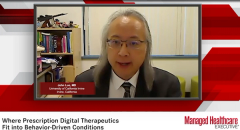
Prescription Digital Therapeutics: Impact of COVID-19
Considerations regarding the impact of COVID-19 on managing patients with behavior-driven conditions, and its positive effects on increasing attention around the topic of prescription digital therapeutics.
Episodes in this series

Megan Coder, PharmD, MBA: Dr Peskin, I’m be curious to get your perspective, especially now that we’re in this COVID-19 [coronavirus disease 2019] era, and it looks like we’ll be in it for some time. I’m curious what type of increased need have you seen for these products given their scalability and accessibility. I’m interested to hear your thoughts on the COVID-19 side.
Steven Peskin, MD, MBA, FACP: We did a tremendous amount on telemedicine. I realize that is not digital therapeutics, but it was something that stood up very rapidly. We worked with some of our clinical partners to expand access for urgent care, primary care, acute care, longitudinal care for diabetics, and people with chronic conditions. Telehealth has also been widely embraced by behavioral health professionals, which was a COVID-19 response. Regarding digital therapeutics, we have not specifically developed payment scheme or model, but COVID-19 has certainly accelerated our efforts to look at what might be called nontraditional. The traditional model is 1 person in an office. I was seeing patients on Tuesday with a mask on and a shield, which was very encumbering and a tough thing to do for 6 hours. Regardless, this area of digital therapeutics juxtaposed to telehealth and other ways to provide or deliver services virtually is very compelling, and COVID-19 is certainly an accelerant.
Megan Coder, PharmD, MBA: Dr Luo, it would be interesting to hear your thoughts.
John Luo, MD: I would echo that because I work on the consultation service in the emergency department [ED] and in the main hospital. I can tell you that our volumes are high. We have many patients who had no premorbid psychiatric conditions who now have depression and anxiety related to COVID-19. Our systems of mental health care, especially here in Southern California, because of the high numbers are stretched thin.
Not everybody has adopted videoconferencing technology. People still doing visits by phone and patients are dissatisfied. They oftentimes become noncompliant with medications, so they end up in my ED and I must see them and try to figure out how to bridge the gap of care. Providers like myself, and my colleagues in the outpatient and inpatient settings, desperately want more tools to provide patients with a way to keep them well. Moreover, we want a way to keep them needing either inpatient hospitalization or showing up in our ED. The pandemic unfortunately has really magnified this huge need.
Steven Peskin, MD, MBA, FACP: I would echo that. We’ve seen a tremendous increase in benzodiazepine prescriptions, for example.
Megan Coder: Dr Moukaddam, any words on your perspective of digital therapeutics and COVID-19?
Nidal Moukaddam, MD, PhD: COVID-19 has simply accelerated the need for us to use the technology we already have if you want this technology to help you for detection and diagnosis and treatment. For detection, we are woefully underusing telemedicine. I don’t mean we’re not doing enough telemedicine, but I work with engineers and they always tell me, “All you do is use the video part. Why don’t you use the other part? Your screen can measure your vital signs, but nobody uses that.”
No big system has adopted it. It’s very hard to get through 3 IRBs [institutional review boards] to do that. You can also use it to measure gait. There are a lot of gait measurements that can be done remotely. That way, you could use your encounter to have some gait-based measurement. That would be helpful. We don’t do that either. The screen is not used, and the phone has a little sensor that can measure blood flow; therefore, you can measure flushing.
That’s how they measure vital signs. We don’t do that either. We are woefully underusing technology for detection. We’re not even talking about diagnosis. In terms of detecting mental issues, the apps, phones, and wearables could help us so much. We have a study called CovidSense at covidsense.org. Our question was: can we follow people and see who’s going to get depressed? We’re seeing a very distinct pattern in who gets to be in that depression or anxiety group that we didn’t have before that is getting us so much work.
I’m very grateful for the job security, but the conversion into depression and anxiety has been very clear for individuals with preexisting conditions, even if the condition is arthritis.
We have more than 1000 people in that study, which you can see because we’re measuring with a quiz for depression, and you can see that conversion. Clearly, the digital therapeutic could help us with detection and even with diagnosis because we are able to do a fully acceptable questionnaire that’s validated, and we are able to diagnose.
In terms of treatment, we have not implemented just-in-time adaptive intervention, which is certainly something that could be added very easily. We are not using that enough, so the pandemic hopefully will trigger all these advances being put into place.
Megan Coder, PharmD, MBA: I want to thank each of you. I appreciate your perspectives. They are very different but very valuable, and they really work well together in terms of the different perspectives. Thank you for your time and thank you for joining us.
Newsletter
Get the latest industry news, event updates, and more from Managed healthcare Executive.





















